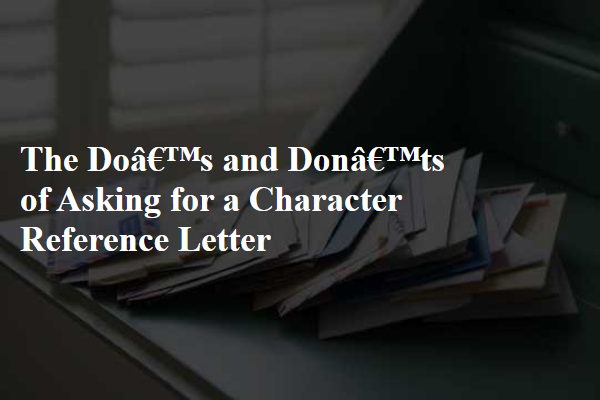
Avoid vague language that fails to provide specific examples of the candidate's skills and achievements, as this weakens the letter's impact. Refrain from exaggeration or dishonesty, which can damage both your credibility and the applicant's chances. Ensure the letter is free from grammatical errors and maintains a professional tone throughout to enhance clarity and trustworthiness.
Overly Generic Language
| Common Mistakes | Description | Impact |
|---|---|---|
| Vague Language | Using generic phrases like "hard worker" without specific examples. | Reduces credibility and weakens the recommendation's effectiveness. |
| Lack of Personalization | Submitting a generic letter that could apply to any candidate. | Fails to highlight unique qualities and achievements of the individual. |
| Overused Cliches | Repeating common expressions such as "team player" without evidence. | Can make the letter appear insincere and unconvincing. |
| Grammatical Errors | Typos, spelling mistakes, and poor sentence structure throughout the letter. | Undermines professionalism and distracts from the candidate's merits. |
| Unbalanced Focus | Emphasizing irrelevant traits or neglecting key accomplishments. | Does not provide a complete picture of the candidate's qualifications. |
| Exaggeration or Dishonesty | Making claims that cannot be substantiated or are misleading. | Risks damaging the referee's reputation and harming the candidate's chances. |
| Lack of Clear Structure | Writing without logical flow, making the letter hard to follow. | Decreases readability and reduces the impact of the message. |
Lack of Specific Examples
Common mistakes in reference letters include vague language that fails to highlight specific achievements or skills. Overly generic praise can reduce the letter's credibility and effectiveness. Avoiding negative comments without context or exaggeration helps maintain a professional and balanced tone.
Excessive Length or Brevity
Reference letters play a crucial role in job applications and academic admissions, making accuracy and professionalism essential. Avoiding common mistakes ensures the letter positively impacts the candidate's opportunities.
- Being too vague - Failing to provide specific examples or detailed information weakens the credibility of the recommendation.
- Using overly formal or cliched language - Generic phrases can make the letter sound insincere and diminish its effectiveness.
- Omitting contact information - Lack of contact details makes it difficult for employers or admissions committees to verify the reference.
Using Vague or Ambiguous Terms
Reference letters play a crucial role in job applications and academic admissions, influencing decision-makers significantly. Avoiding common mistakes ensures the letter positively impacts the candidate's prospects.
- Vague Language - Using generic or unclear phrases diminishes the letter's effectiveness and fails to highlight specific strengths.
- Lack of Personalization - Copying templates or using a one-size-fits-all approach reduces credibility and relevance to the individual.
- Overly Lengthy Content - Writing excessively long letters can dilute key points and lose the reader's attention.
Ensuring clarity, specificity, and brevity enhances the value of reference letters for applicants and evaluators alike.
Neglecting Relationship Details
Reference letters often lose impact due to vague language and lack of specific examples. Clear, detailed information about the candidate's skills and achievements strengthens the letter's credibility.
Another common mistake is including irrelevant personal opinions or unrelated details. Staying focused on professional qualifications and clear evidence of performance ensures the letter remains persuasive and relevant.
Inconsistent or Contradictory Statements
Common mistakes in reference letters include vague language that fails to highlight specific achievements or skills. Overgeneralization reduces the letter's effectiveness by not providing concrete examples of the candidate's strengths. Neglecting to tailor the letter for the intended position can result in a generic recommendation that lacks impact.
Omitting Candidate Weaknesses
Reference letters play a crucial role in job and academic applications by providing credible endorsements. Avoiding common mistakes ensures the letter positively influences the candidate's opportunity.
- Vagueness - Failing to provide specific examples reduces the letter's impact and credibility.
- Exaggeration - Overstating qualifications can undermine trust and damage the candidate's reputation.
- Lack of Professional Tone - Using informal or casual language diminishes the letter's perceived seriousness and value.
Focusing Solely on Personal Traits
Reference letters often suffer from vague language and lack of specific examples, which diminishes their impact. Clear, detailed information about the candidate's skills and achievements strengthens credibility.
Overly generic praise without personalization can make a letter appear insincere. Tailoring each reference letter to the individual ensures relevance and authenticity, enhancing the candidate's prospects.
Ignoring the Target Audience
What are the most common mistakes to avoid in reference letters?
Failing to provide specific examples of the candidate's skills can weaken the letter's impact. Avoid using vague language that does not clearly demonstrate the applicant's qualifications.
Failure to Proofread for Errors
Reference letters play a crucial role in shaping a candidate's future opportunities. Common mistakes can undermine the letter's effectiveness and credibility.
One frequent error is providing vague or generic statements that lack specific examples of the candidate's skills and achievements. Overly lengthy or wordy letters may dilute the main message and lose the reader's interest. Failure to tailor the letter to the particular position or institution can make the recommendation less impactful.



Comments